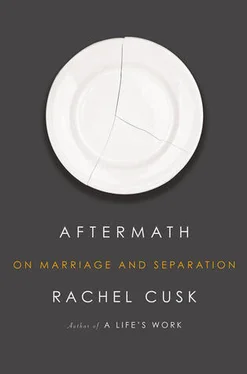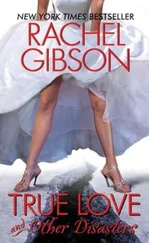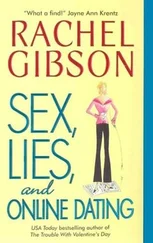It’s quite nice really, I say to the children, as though we make a habit of staying in places such as this, and can compare them to one another. In fact they have had the good fortune never to have been somewhere like it before. But I’m not interested in teaching them a lesson.
Yes, they repeat, standing in the doorway with their coats on, it’s quite nice really.
And tomorrow you’re going riding, I say.
They fall silent. They’re not sure they want to go riding after all. They’re not sure they feel like it.
I make them supper on the two-ring electric burner in the kitchenette. I tuck them up beneath the floral headboards. I sympathise, I console, I sit at their bedsides until far into the night, but in the morning I drive them to the riding school and I leave them there.
At mid-morning there is a great commotion out in the hall, loud voices and banging and then a thumping sound that gets louder and louder until I realise it’s coming up the stairs. There is a pause, the sound of noisy breathing on the landing; the door to the flat flies open and a woman barges into the cramped hall.
Oh hello, she says at the sight of me sitting at the table. I didn’t realise you were in here.
I take this to be the owner of the building. She is so dishevelled it is hard to get a sense of her. Vaguely I apprehend a large mounded body, a shock of grey frizzy hair, a clutch of big yellow teeth, a red leathery face grotesquely made up. The teeth are bared: she is either panting or smiling, I can’t tell. She has a pair of crutches strapped to her arms on which she leans forward and with which she occasionally gestures, like the forelegs of some gigantic insect.
It’s a long way up, she pants, but I make a point of doing it, no matter what they say. You can’t let things get out of bounds, can you? It happens without you noticing, then all at once you find you’re bedridden.
Looking at her, I’m surprised she did manage to get up the stairs, for she has only one leg. I ask her if she would like to sit down.
Are you all right? she says sharply in response. Her voice is rather loud and braying; I notice her clothes, rainbow-coloured draperies in chiffon and velvet. Like it here? Such a lovely house, isn’t it? These are our best rooms. Her glance darts around. What’s that you’re doing? she says, looking at what’s on the table.
Writing, I say.
I’m a writer too, she says, leering delightedly at me. What a coincidence!
Yes, it is, I say.
Of course, I don’t write under my own name, she adds, significantly.
There is a pause.
Are you all right? she says again. It’s nice up here, isn’t it? Perfect for writing. Really I should come up here and do some writing myself, only I’m so madly busy all the time. She gives me a hostessy kind of twinkle. Then she says:
But I’m afraid I’m going to have to move you.
Move me? I say.
It’s only downstairs, she says. It’s just that some other people want to be up here. They want to rent it long-term. They’re a family, she says. Lovely people. They’re relocating to this area and they absolutely have to have it.
I tell her that she should have told me this in advance.
Oh, but you see I didn’t know! she cries. They only called last night, and they’re desperate, poor things. The girl is absolutely at her wits’ end — they’ve just come back from Geneva I think it is, where her husband’s some big cheese, and she’s had to make all the arrangements herself, and my heart just bled for her really. The thing is, she’s got the children to think of. Such a sweet family, she says.
I ask her when she expects us to move.
Well, she says, if you don’t mind, then right away would be best. They’re coming tonight and the cleaner needs to get in — you’ll be absolutely fine downstairs. You’re really tucked away down there, she says. Perfect for writing!
‘Downstairs’, it turns out, is the basement, a big windowless room crammed with furniture, whose ceiling is so low the hairs on the top of my head brush it as I walk. It takes me three or four journeys up and down the stairs to bring down the suitcases we had just unpacked. I pass numerous people on the staircase, in the hall. It is eleven o’clock in the morning, but in the basement you wouldn’t know whether it was night or day. I stand in the electric light from the overhead bulb, the suitcases at my feet. I can hear the thump of the woman descending the cellar stairs. She puts her head around the door.
Everything all right? she says, panting. Got to run now — so much to do! You’ve got one or two people above you, Poles, lovely family, they’re usually very quiet. Oh and by the way, the men are here today doing some building work in the hall, but hopefully the noise won’t disturb you too much. Bye bye!
And with a wink of her fronded eye, she is gone.
I go for a walk. I have to: I can’t stay in the basement for even a few minutes. The clear skies of the night before have been succeeded by blustering wind and cloud. It starts to rain. I think of the children riding their horses in the bad weather. I can’t find a path out of the town into the countryside and I end up walking along busy roads, and then through a kind of forest where broad sandy tracks pass amid shaved stretches of felled trees, and lorries piled with pale logs trundle to and fro.
When I return I call the witch, as I now think of her. It takes time to track her down: I have to try several different numbers.
Oh it’s you, she says.
I tell her she needs to find us somewhere else to stay, immediately. I tell her I wouldn’t keep a dog in that basement. I tell her her conduct has been fraudulent. She needs to rectify the situation by the time my children return from the riding school.
While I’m speaking she makes little exclamations, ‘yes’ and ‘oh’ and ‘oh dear’ and ‘of course’. The more she whimpers, the more brutal I am. I enjoy it: this must be what it feels like to beat someone up. Yet I think about her missing leg and feel afraid.
She says that we can come and stay in her very own house, a lovely place out in the countryside. She’d like us to; she’d like to make amends. I don’t trust her: I say I want to see it first. She offers to drive me out there in her car to look. I sit on a suitcase in the basement and wait. The building is full of the sounds of drilling. There are footsteps going to and fro across the ceiling, voices, the noise of a television on loud. The witch arrives, clad in a miscellany of crushed velvet draperies of purple and cerise; I follow her out to her car and get in. The car is filthy. She has a special arrangement of gears and levers for driving. On the journey she talks. I don’t listen. I am silent, except to ask her how far it is. Oh, not very far, she says. It’s really very close. Just a few miles.
We pass over the snaking river and out of the picture-postcard town, out into unfamiliar countryside. I sit and stare out of the window. In the rain the patchwork of fields and buildings looks desolate. At a petrol station she stops, and I stare out of the window as she hobbles around the pump, the crushed velvet lurid in the drizzle. She goes inside. I watch her talking to the girl behind the till, watch her mouth moving, watch her throwing her head back to laugh. She talks for a long time. Eventually she returns. We drive for half an hour, forty-five minutes. I ask her when we will be there. Oh, any minute now, she says. It’s just around the corner.
Finally, as we are driving along a section of dual carriageway through low hills, she veers unexpectedly off the road and draws to a halt outside a house, so abruptly that we are thrown forward in our seats. We have pulled up at a cottage with crooked chimney-pots. There are pieces of broken furniture in the front garden, and rags hanging at the tiny windowpanes. The road lies so close to the front gate that the passing traffic makes it swing on its hinges. We get out of the car.
Читать дальше












